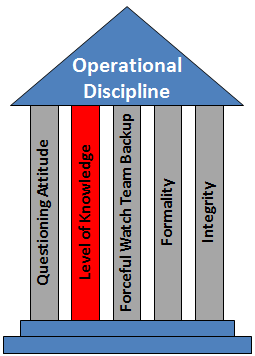 How do you know if you are doing the right thing? What is the right thing to? Why is it the right thing to do? How do you do it the right way? Do you know what the intended outcome is? These might seem like very basic questions, but being in a position to answer them is the first step in achieving Operational Discipline – doing the right thing, the right way, every time. You must have the appropriate Level of Knowledge to determine what the right thing to do is and to understand your environment well enough to know what the right way is. This implies a level of knowledge that extends beyond just knowing a work procedure or where to find information; it means employees must understand the systems and environments they work in to a deep enough level that they can think on their feet and identify abnormal conditions and potential hazards. They must continually seek greater knowledge. And this level of knowledge and understanding extends beyond employees’ immediate work areas; they must also be aware of how their work interacts with, relies on and is relied upon by the work being done elsewhere in the operation.
How do you know if you are doing the right thing? What is the right thing to? Why is it the right thing to do? How do you do it the right way? Do you know what the intended outcome is? These might seem like very basic questions, but being in a position to answer them is the first step in achieving Operational Discipline – doing the right thing, the right way, every time. You must have the appropriate Level of Knowledge to determine what the right thing to do is and to understand your environment well enough to know what the right way is. This implies a level of knowledge that extends beyond just knowing a work procedure or where to find information; it means employees must understand the systems and environments they work in to a deep enough level that they can think on their feet and identify abnormal conditions and potential hazards. They must continually seek greater knowledge. And this level of knowledge and understanding extends beyond employees’ immediate work areas; they must also be aware of how their work interacts with, relies on and is relied upon by the work being done elsewhere in the operation.
What does having the appropriate Level of Knowledge look? An incident that stands out in my mind as a time an employee did not have the appropriate Level of Knowledge was when I was supervising in an automotive assembly plant. One of my utility operators relieved another employee for 15-20 minutes installing the tie-down bracket attached the cars’ frames that are used during shipping. This shouldn’t have been an issue – the utility operator knew the process to follow (put the bracket in place and attach it with two bolts) and what tools to use.
But that was, unfortunately, the extent of his knowledge. He ended up installing the brackets upside-down on about 20 cars and we didn’t find out about it until a few hours later when suspension components installed later down the line didn’t fit. How could the appropriate Level of Knowledge have helped in this situation? For starters, the utility operator didn’t really “know” the process, but he thought he did and didn’t confirm the right way of doing things before relieving the primary operator. If he had known what the parts he was installing were used for and how they were used, it would have been obvious that the way he was installing them was incorrect. And finally, if he had been more broadly aware of other components that had to be installed around those brackets (outside of his work area), he would have known that they could not be installed properly with the brackets oriented in the way he was installing them. You can see how knowledge and understanding of what you are doing, why you are doing it, how you should do it and how your work is related to the work of others supports “doing the right thing, the right way, every time.”
The responsibility for achieving the appropriate Level of Knowledge is dependent on both management and employees. Management must make training available, foster an environment that encourages seeking knowledge and demonstrate broader understanding of the operation as a whole. While management can ensure that the right tools and guidance to acquire knowledge exist, it is the responsibility of employees to seek out and acquire the knowledge and understanding they need to perform their jobs. They must ask questions and push to deeper levels of understanding and be comfortable seeking that level of understanding beyond their own work areas. And, in turn, they must also be willing to share that knowledge with others as they seek knowledge.
